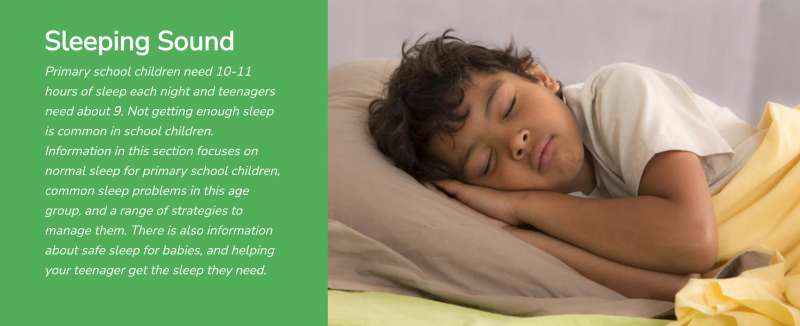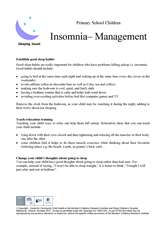Insomnia
Insomnia
Check out some strategies for managing insomnia in children. Good sleep habits are really important for children who have problems falling asleep (insomnia).
Key points about managing insomnia
- good sleep habits are really important for children who have problems falling asleep
- teaching your child ways to relax can help them fall asleep
- you can help your child have good thoughts about going to sleep rather than bad ones
- remove the clock from the bedroom, as your child may be watching it during the night
- to get on top of insomnia you can temporarily set your child's bedtime later
This page is about sleep in primary school children. It's part of a whole section on sleeping sound.
How can I establish good sleep habits for my child?
Good sleep habits are really important for children who have problems falling asleep (insomnia).
Good habits should include:
- going to bed at the same time each night and waking up at the same time every day (even on the weekends)
- avoiding caffeine (often in chocolate bars as well as Coke, tea and coffee)
- making sure the bedroom is cool, quiet, and fairly dark
- having a bedtime routine that is calm and helps kids wind down
- avoiding over-exciting activities before bed like computer games and TV
Remove the clock from the bedroom, as your child may be watching it during the night, adding to their worry about not sleeping.
How can I help my child relax?
Teaching your child ways to relax can help them fall asleep. The following relaxation idea is an example of one you can teach your child.
Your child lies down with their eyes closed and then tightens and relaxes all the muscles in their body, one after the other. Some children find it helps to do these muscle exercises while thinking about their favourite (relaxing) place such as the beach, a park or in granny’s backyard.
How can I change my child's thoughts about going to sleep?
You can help your child have good thoughts about going to sleep rather than bad ones. For example, instead of saying, "I won't be able to sleep tonight," it is better to think, "Tonight I will just relax and rest at bedtime".
Should I change my child's bedtime?
To get on top of insomnia you can temporarily set your child's bedtime later. For example, if your child usually falls asleep at 11pm set their bedtime to 10.45pm to start with. Being extra sleepy will help your child fall asleep right away and stay asleep. After a couple of nights, the bedtime can be moved forward to 10.30pm. Once your child is able to fall asleep quickly you can then bring their bedtime forward to 10.15pm. Continue this until the desired bedtime is reached.
Should I take my child out of bed?
If your child is still tossing and turning 20 minutes after being taken to bed, let your child leave the bedroom for 20 minutes to do something quiet, such as reading. This helps your child see their bedroom as a place for sleep. This also helps to stop your child from linking their bedroom with not being able to sleep. After 20 minutes take your child back to bed. You may need to repeat this cycle a number of times.
See more KidsHealth content on sleeping sound
This page last reviewed 15 March 2023.
Do you have any feedback for KidsHealth?
If you have any feedback about the KidsHealth website, or have a suggestion for new content, please get in touch with us.
Email us now

